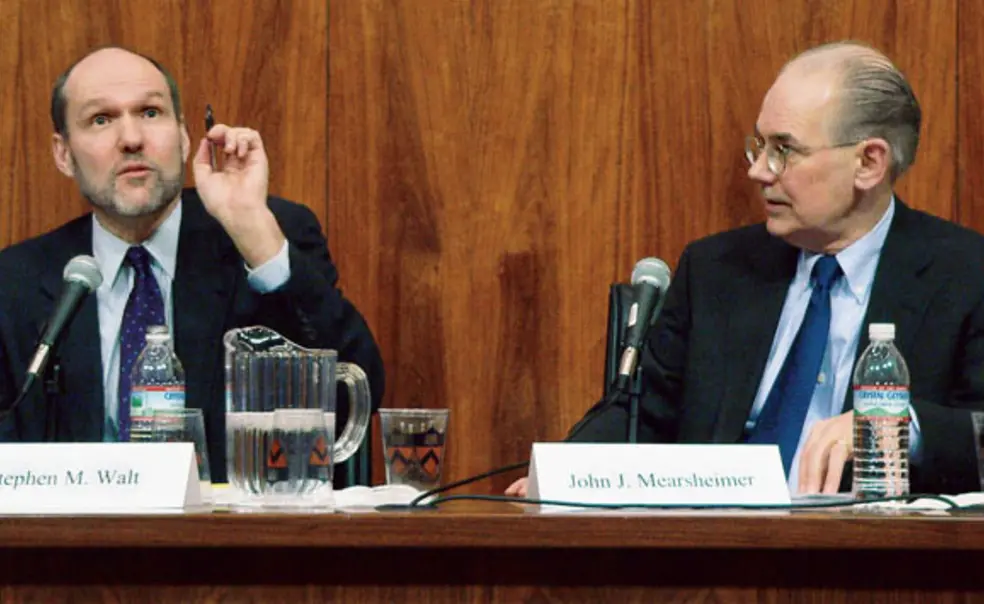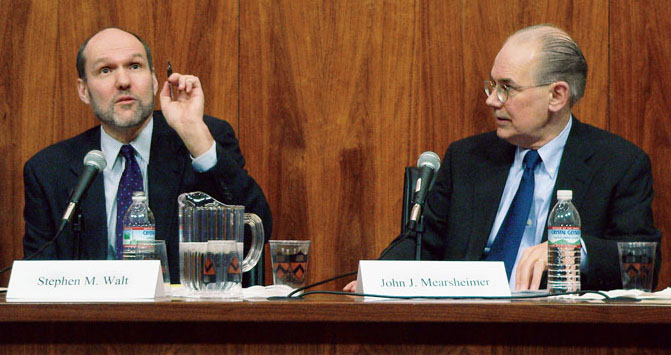A heated response to authors of 'Israel lobby' book
The authors of a controversial book on the “Israel lobby” addressed a packed Dodds Auditorium Dec. 10, bringing with them a fierce debate over scholarship and charges of anti-Semitism.
In their book, The Israel Lobby and U.S. Foreign Policy, John Mearsheimer, a political science professor at the University of Chicago, and Stephen Walt, academic dean of Harvard’s Kennedy School of Government, assert that America’s “special relationship” with Israel works against its best interests.
The authors maintain that a loose network of interest groups — including right-wing Christian evangelists, neo-conservatives, the American Israel Public Affairs Committee, and the Anti-Defamation League — has pushed U.S. foreign policy in a way that has intensified America’s unpopularity in the Middle East and fueled the threat of terrorism.
Israel is the largest recipient of U.S. economic and military aid, receives consistent U.S. diplomatic support, “and we almost always take its side in regional disputes,” Walt said.
Mearsheimer said that “Israel, and especially the lobby, were two of the main driving forces behind the decision to invade Iraq.” The event moderator, Wilson School Professor Robert Keohane, sharply disagreed, saying it was not difficult to list nine other plausible reasons for the war.
Keohane described the book as a “very flawed work of political science.”
In a heated question-and-answer session, one student echoed other critics of the book who have charged that its thesis is anti-Semitic, saying that the professors were seeking “to explain a losing war [in Iraq] by blaming the Jews.” Mearsheimer responded that the war “was due in large part to the influence of the Israel lobby, especially the neo-cons within it, not the American Jewish community.”
Professor Cornel West *80 questioned “the philosophical limitations of a realist analysis” and asked: “How do you weigh values and principles vis-à-vis interests and security?”
“Sometimes your interests and your morals line up,” Walt replied. “The United States would find its strategic interest better served, and would be taking a much more moral stance vis-à-vis the Palestinians” by pressuring both sides to create a viable Palestinian state, he said.
The Daily Princetonian published an open letter by politics professor Aaron Friedberg to the event organizers, voicing concern about Walt and Mearsheimer’s book and its impact.
“Despite its scholarly apparatus of footnotes and quotations, and despite the authors’ distinguished credentials, this is not a work of objective academic analysis but rather a one-sided and tendentious polemic,” he wrote.
Friedberg told PAW that while he had heard from students, faculty, and alumni who shared his concerns, “I think most everyone believes very strongly in people being allowed to express their views, whatever they are.”
The Prince also printed a pair of student columns taking issue with Walt and Mearsheimer. However, Muslim Students Association President Sarah Dajani ’09 praised the authors for daring to address a controversial topic and wrote: “Have we reached the point where criticism of Israel is on par with racism and bigotry?”













No responses yet